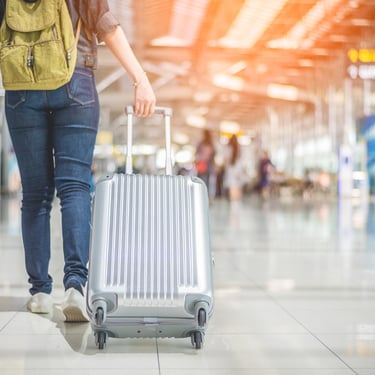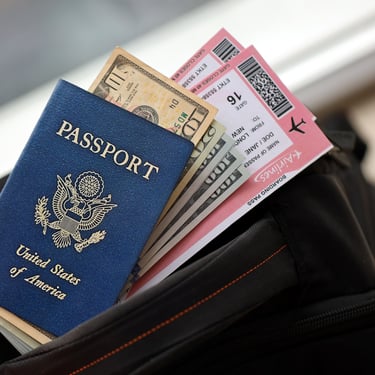10 Common Travel Problems in the Dominican Republic & Fixes
Worried about travel issues in the Dominican Republic? Learn how to solve flight delays, lost luggage, scams, bad weather, and more for a stress-free vacation
TRAVEL TIPS
2/3/202616 min read


If you’re planning a trip to Punta Cana, Bayahibe, or Santo Domingo, your vacation should be about beaches, adventure, and relaxing, not dealing with flight delays, lost luggage, scams, or bad weather. This guide covers the most common travel problems in the Dominican Republic and shows you exactly how to resolve them, so you can protect your time, money, and enjoy a well-deserved, stress-free trip.
Table of Contents
Travel Problems – Simplified
✈️ Flight delays – Check your airline app, ask about rebooking or vouchers, and use AirHelp or travel insurance if your plans are affected.
🧳 Lost luggage – Report it before leaving the airport, keep your claim number, and track your bag with a small GPS tag. Ask for delivery to your hotel once it’s found.
🏨 Hotel issues – Take a quick photo, speak to the front desk, and ask for a room change or upgrade. If needed, switch to well-reviewed stays on Hotels.com or Booking.com.
🚐 No-show tours or transfers – Message the provider, ask your hotel for help, or rebook with verified options on Viator or a trusted airport transfer.
🤒 Getting sick – Rest, hydrate, visit a pharmacy, and keep a simple travel health kit and first-aid kit.
💸 Overcharged – Agree on prices upfront and stick to fixed-price tours on Viator.
👜 Theft worries – Carry only what you need, keep valuables hidden, and use a crossbody bag or money belt.
🛂 Passport problems – Save a digital copy, file a police report if stolen, and contact your embassy for an emergency document.
🌧️ Bad weather – Switch to indoor plans, move tours to the next clear day, and choose flexible, refundable experiences on Viator.
🌊 Rough sea or seaweed – Follow beach flags, ask locals about conditions, and choose hotels near calmer beaches in the Dominican Republic on Hotels.com or Booking.com. Check recent beach photos to see current conditions.




1. Flight Delays & Cancellations
Flights can be delayed or canceled because of weather, mechanical issues, staffing shortages, or overbooking. This often leads to missed connections, extra costs, and a lot of unnecessary stress.
What to Do:
✅ Check Your Flight Status Frequently
Use your airline’s website or mobile app to check your flight status before leaving for the airport.
Flight delays can happen at any time, even after check-in, so stay updated.
✅ Sign Up for Flight Alerts
Most airlines offer free text or email notifications about delays, cancellations, and gate changes.
For real-time updates, use flight-tracking apps like FlightAware
✅ Know Your Rights & Compensation Policies
In many cases, airlines must offer compensation for long delays or cancellations, especially for reasons within their control (e.g., mechanical issues, overbooking).
In the U.S.: Airlines are not required to compensate for delays, but some may provide vouchers, meal allowances, or hotel stays at their discretion.
In the EU (Regulation EC 261/2004): Passengers may be entitled to up to €600 in compensation for delays over 3 hours or cancellations without proper notice.
Use services like AirHelp to check if you qualify for compensation and file a claim.
💡Why Use AirHelp
Figuring out if you qualify for flight delay compensation can be confusing. AirHelp checks your flight for free and tells you if you are eligible. If you are, they handle the claim process with the airline, including legal follow-up when needed. You only pay a fee if compensation is successfully recovered.
Check your flight now and see if you are owed compensation with AirHelp
✅ Consider Travel Insurance
If your flight is significantly delayed or canceled, travel insurance can reimburse non-refundable expenses (like hotel bookings or excursions).
Look for policies that specifically cover flight disruptions. Some providers even offer trip delay benefits to cover meals and lodging.
Read more about Travel Insurances Like Travelex
💡Why Use Travelex Insurance
Travelex Insurance offers plans that can include trip delay, trip cancellation and interruption, missed connection, baggage coverage, and 24/7 travel assistance.
Compare Travelex travel insurance plans and protect your trip.
✅ Be Prepared with a Backup Plan
If your flight is canceled, check alternate flights immediately—availability can disappear fast.
Have airline customer service numbers saved and use social media (Twitter/X, Facebook, Instagram) to reach your airline quickly.
Consider alternative airports or different airlines to reach your destination sooner.
✅ For Overbooked Flights: Volunteer or Get Compensated
If an airline oversells seats, they may ask for volunteers to give up their seats in exchange for flight vouchers or cash compensation.
If you’re involuntarily bumped, airlines in the U.S. must compensate you up to 4x the ticket price (max $1,550) depending on the delay length.
2. Lost or Delayed Luggage
Your checked bag doesn’t show up at baggage claim, or it arrives much later than expected. This can leave you without essentials, cause stress, and even ruin parts of your trip.
What to Do:
✅ Pack Essentials in Your Carry-On
Always keep medications, a change of clothes, chargers, important documents, and valuables in your carry-on. This way, even if your checked luggage is delayed, you’ll have what you need for the first 24–48 hours.
✅ Use Luggage Tags with Updated Contact Info
Ensure your bag has a sturdy, visible luggage tag (Buy here on Amazon) with your name, phone number, and email (avoid full home addresses for security reasons).
Place an extra copy of your contact details inside your luggage in case the tag is lost.
✅ Report Lost Luggage Immediately
If your bag doesn’t arrive, go straight to the airline’s baggage claim office before leaving the airport.
Provide your baggage claim ticket and flight details so they can track your bag.
Most airlines will deliver your luggage to your hotel or address once found—confirm this before leaving the airport.
✅ Track Your Luggage with AirTags or Tile Trackers
Place an Apple AirTag, Tile, or Samsung SmartTag inside your suitcase so you can track its location in real-time.
If your airline claims they “don’t know where your bag is,” you’ll have proof of its last known location to speed up recovery.
✅ Know Your Compensation Rights
Most airlines will reimburse you for essential purchases (like toiletries and clothing) if your bag is delayed for more than 24 hours.
If your bag is officially lost, airlines must compensate you up to:
$3,800 in the U.S. (Department of Transportation)
€1,600 in the EU (Montreal Convention rules)
$2,300 internationally under most airline policies.
Keep receipts for purchases you make while waiting for your luggage—you may be able to claim the expenses later.
✅ Prevent Lost Luggage Before It Happens
Take a photo of your bag before checking it in (helps with lost baggage claims).
Use a colorful luggage strap or tag to make your bag easier to spot.
Arrive early at the airport—last-minute check-ins increase the risk of bags missing your flight.
3. Hotel Surprises (Not in a Good Way!)
Sometimes a hotel does not match the pictures online. Rooms may be smaller, older, or missing key amenities. In some cases, Wi Fi is weak, air conditioning does not work well, or the pool is under maintenance, leaving you disappointed.
What to Do:
✅ Read Recent Reviews Before Booking
Always check recent reviews on sites like Hotels.com, Booking.com, or TripAdvisor to get up-to-date guest experiences.
Pay attention to comments about cleanliness, customer service, Wi-Fi strength, and maintenance issues.
Look at traveler photos rather than just the official hotel images.
Hotels.com helps you find and book great hotel deals in Punta Cana and across the Dominican Republic, with easy price comparisons, real guest reviews, and flexible booking options.
✅ Double-Check Amenities Before Confirming
Not all hotels offer the same amenities, so confirm before booking:
Wi-Fi quality (some resorts charge extra or only offer it in common areas).
Air conditioning (some budget hotels only provide fans).
Pool & beach access (check if it’s open year-round).
Breakfast inclusion (some listings are room-only).
Contact the hotel directly if something is important to you.
✅ If You’re Unhappy, Politely Ask for an Upgrade
If the room isn’t as expected, talk to the front desk calmly and politely—many hotels will offer an upgrade or a better room if available.
If there’s a major issue (noisy room, broken AC, poor cleanliness) and they can’t fix it, ask if they can compensate with a discount or another perk (free spa treatment, resort credit, etc.).
If the hotel refuses to help and it’s truly unacceptable, contact the booking platform (Hotels.com, Booking.com) or travel agent for assistance.
✅ Book Flexible Rates & Know Cancellation Policies
Some hotels offer free cancellation or flexible booking options, which can be helpful if you arrive and it’s not what you expected.
If unsure, book your first night only and decide if you want to extend your stay after seeing the hotel in person.
✅ Consider Upgrading to a Trusted Hotel Chain
If reliability is important, well-known hotel brands (Marriott, Hilton, Iberostar, Hyatt, etc.) often provide consistent quality.
4. No-Show for Excursions or Airport Transfers
Sometimes, pre-booked excursions, tours, or airport transfers don’t show up as scheduled, leaving you stranded or forced to make last-minute arrangements. This can happen due to miscommunication, overbooking, or unreliable service providers.
What to Do
✅ Confirm Your Booking 24-48 Hours in Advance
Contact the tour operator or transfer company via email, phone, or WhatsApp a day or two before your scheduled service.
Double-check the pickup location, time, and meeting point to avoid misunderstandings.
✅ Book with Reputable Companies
Use trusted platforms like Viator, HolidayTaxis, or reputable local agencies with verified reviews.
If booking directly through a hotel or resort, ask for a contact number in case of delays.
💡 Why Use Viator
As part of the Tripadvisor platform, Viator gives you access to 300,000+ tours and experiences worldwide, with easy comparisons, real traveler reviews, and flexible booking options. Many activities offer free cancellation or Reserve Now and Pay Later, so you can lock in popular spots before they sell out.
Compare Viator experiences today and book unforgettable activities for your trip.
✅ Have a Backup Plan
For airport transfers:
If your ride doesn’t show, use Uber (available in Santo Domingo, Punta Cana, and Santiago) or a registered taxi service.
Most hotels can arrange last-minute transportation if needed.
For excursions:
If your tour is canceled or delayed, ask about alternative time slots or refunds.
Consider booking a similar tour through another provider if availability allows.
✅ Know the Cancellation & Refund Policy
Check the terms and conditions when booking—some companies offer full refunds if they fail to provide the service.
If paying through Viator, HolidayTaxis, or a credit card, you may be able to dispute the charge if the provider does not deliver as promised.
✅ Keep Emergency Contacts Handy
Save the local customer service number of your tour or transfer provider in case of issues.
If your excursion includes hotel pickup, ask the hotel concierge for help in reaching the provider.
5. Getting Sick or Facing Health Hazards
Traveling to the Dominican Republic means exposure to different climates, foods, and environments. Common health issues like sunburn, mosquito bites, dehydration, allergies, and traveler’s diarrhea can put a damper on your trip if you're not prepared. Even with the best precautions, getting sick while traveling can happen.
What to Do
✅ Protect Yourself from Mosquito-Borne Illnesses
Mosquitoes in the Dominican Republic can carry diseases like dengue, Zika, and chikungunya. Take these precautions:
Use insect repellent with DEET, picaridin, or oil of lemon eucalyptus (OLE) for the best protection.
Wear light-colored, long-sleeved shirts and pants, especially at dawn, dusk, and near water.
Choose accommodations with air conditioning or mosquito nets, especially in rural areas.
✅ Stay Hydrated & Avoid Heat-Related Illnesses
The Dominican Republic is hot and humid, making dehydration and heat exhaustion common.
Drink plenty of fluids—bottled water, coconut water, or electrolyte drinks.
Watch for signs of heat exhaustion: dizziness, nausea, excessive sweating, or confusion.
✅ Avoid Traveler’s Diarrhea & Food Poisoning
Eating unfamiliar foods or drinking contaminated water can lead to stomach problems.
Stick to bottled or purified water—tap water is NOT safe to drink.
Avoid ice cubes unless you know they’re made from purified water. Ice machines in resorts are usually safe.
Choose well-reviewed, busy restaurants (fresh food is served more often).
Be cautious with street food—only eat it if it’s cooked fresh and served hot.
Wash or peel fruits and vegetables before eating.
✅ Prevent & Treat Sunburn
Strong UV rays can cause painful sunburns, which can lead to long-term skin damage.
Apply broad-spectrum sunscreen (SPF 70+), reapplying every 2 hours (more if swimming).
Wear a hat, sunglasses, and sun-protective clothing.
Avoid direct sun exposure from 10 AM to 4 PM, when the sun is strongest.
✅ Pack a Travel Health Kit
A small first-aid kit can save you from an unexpected trip to the pharmacy. Consider packing:
Anti-diarrheal medicine (Imodium)
Electrolyte packets (for dehydration)
Pain relievers (ibuprofen, acetaminophen)
Antihistamines (for allergies or insect bites)
Antibacterial ointment (for cuts and scrapes)
Motion sickness pills (if taking boat trips)
💡 Tip: A Travel health kit or first-aid kit from Amazon are easy to pack and can save you time when you need something quickly.
✅ Know Where to Get Medical Help
If you feel sick, visit a Farmacia (pharmacy)—pharmacists in the Dominican Republic can recommend over-the-counter medications.
For serious health concerns, research the nearest private hospitals or clinics before your trip. Some top options include:
Consider travel health insurance that covers medical emergencies abroad. Read more.
6. Getting Overcharged or Scammed
You may get charged higher prices for taxis, souvenirs, and activities in the Dominican Republic. Some vendors take advantage of visitors who don’t know the local prices, and scams can happen if you're not careful.
What to Do:
✅ Negotiate & Agree on Prices Before Taking a Taxi
Always agree on a price first if using a local taxi—some drivers may try to charge inflated rates after the ride.
Uber is available in Santo Domingo, Santiago, and Punta Cana, offering fair, upfront pricing with no haggling.
Avoid unofficial taxis (unmarked cars) and stick to registered taxis or ride-sharing apps.
✅ Know the Average Prices for Tours & Activities
Research standard rates before booking tours or excursions. Websites like Viator, GetYourGuide, and TripAdvisor provide price comparisons and customer reviews.
Book through reputable companies instead of random street vendors offering "special deals."
✅ Be Cautious with Street Vendors
Some vendors overcharge or use aggressive sales tactics to pressure tourists into buying souvenirs or services.
If a vendor seems too pushy, politely decline and walk away.
Bargaining is common at markets—don’t be afraid to negotiate, but keep it fair.
✅ Double-Check Your Bills & Change
Always count your change when paying in cash, especially in markets or small shops.
Review restaurant bills carefully—some places may add an extra service charge or include items you didn’t order.
Be aware of currency confusion—some dishonest vendors may try to give back change in pesos instead of dollars (if you paid in USD) at an unfavorable rate.
✅ Pay Securely & Avoid Credit Card Scams
When using a credit card, ask for the machine to be brought to your table instead of handing over your card.
Avoid ATMs in isolated areas—use those inside banks or malls to reduce the risk of skimming fraud.
✅ Use ATMs Located Inside Banks for Safety
To reduce the risk of ATM fraud or card skimming, only use ATMs inside bank branches or shopping malls.
Avoid standalone ATMs in tourist areas or on the street, as they may have higher fees or be tampered with.
Popular banks with reliable ATMs include:
Banco Popular
Banco BHD León
Banreservas
✅ Exchange Money at Reputable Locations
The best exchange rates are usually found at official exchange offices (casas de cambio) or inside banks.
If withdrawing cash, use ATMs that dispense Dominican pesos (DOP) instead of exchanging foreign currency at the airport or hotels (which often have poor rates).
Always check the current exchange rate before exchanging money—apps like XE Currency.
✅ Avoid Unofficial Money Changers
Be cautious of street money changers offering “great rates”—they may shortchange you or use tricks to give you less than expected.
If you must exchange money outside of a bank, count your cash carefully before leaving the counter.
7. Safety Concerns & Petty Theft
While the Dominican Republic is generally safe for tourists, pickpocketing can happen, especially in busy tourist areas, markets, and public transportation hubs. If you flash your valuables, carry large amounts of cash, or let your guard down, you may become an easy target.
What to Do:
✅ Carry Only What You Need
Avoid carrying large amounts of cash.
Keep a backup credit card and some emergency cash in a separate location (like a different pocket or your hotel safe).
Many places accept credit cards, but always carry some small bills (pesos) for taxis, tips, and street vendors.
✅ Use a Crossbody Bag or Money Belt
A crossbody bag with anti-theft features (locking zippers, RFID protection) is safer than a backpack or shoulder bag.
A money belt or hidden pouch is a great way to secure cash, passport, and important documents.
Be mindful of bag snatchers when sitting at outdoor cafes—keep your bag on your lap or looped around your chair leg.
✅ Stay Alert in Crowded Areas
Pickpockets work in groups and often create distractions (e.g., bumping into you, asking for directions, or dropping something nearby).
Be extra cautious in:
Busy markets & shopping areas
Public transportation (especially guaguas & motoconchos)
Tourist hotspots like Zona Colonial & beach vendors
Don’t flash expensive items—keep jewelry, designer bags, and the latest iPhone out of sight in crowded places.
✅ Use Reputable Transportation & Stay in Safe Areas at Night
At night, stay in well-lit areas and avoid walking alone in quiet streets or beaches.
Use Uber in Santo Domingo, Punta Cana, and Santiago instead of hailing taxis, which may overcharge or be unsafe.
Avoid motoconchos (motorbike taxis) at night—they can be risky, especially for tourists unfamiliar with the roads.
If renting a car, keep doors locked at all times and avoid stopping in isolated areas.
✅ Keep Your Hotel Room Secure
Always use the hotel safe for passports, extra cash, and valuables.
If your accommodation doesn’t have a safe, consider using a portable travel safe
Lock your balcony doors—especially on lower floors, as thieves sometimes target unlocked hotel balconies.
8. Stolen or Lost Passport
Losing your passport or having it stolen can delay your trip, cause stress, and complicate travel plans, especially if you have an upcoming flight. Replacing a lost passport takes time, so knowing what to do before and after it happens can help you stay prepared.
What to Do:
✅ Make Digital & Physical Copies Before Your Trip
Scan your passport and store a copy in your email, phone, or cloud storage (Google Drive, Dropbox, iCloud).
Print a copy and keep it in a separate part of your luggage from your actual passport.
Carry an extra form of ID (driver’s license, state ID, or another government-issued ID) in case you need to verify your identity.
✅ Use Hotel Safes & Avoid Carrying Your Passport Everywhere
Keep your passport in your hotel safe unless you need it for official purposes.
If you must carry it, use a money belt, anti-theft bag, or a hidden pouch for added security.
Be cautious of pickpockets in crowded areas, buses, and tourist hotspots—they often target travelers.
✅ Know Your Embassy or Consulate
If you lose your passport, you’ll need to visit your country's embassy or consulate for a replacement. Here are the key locations in the Dominican Republic:
If your country does not have an embassy or consulate in the DR, contact an embassy from an allied country (e.g., EU or Commonwealth nations) for assistance.
✅ File a Police Report if Your Passport is Stolen
Visit the local police station and report the theft. Ask for a written police report—your embassy will likely require it before issuing a replacement.
If your wallet or bag was stolen with your passport, cancel any lost credit cards immediately.
✅ Get an Emergency Passport or Travel Document
Go to your embassy with:
A copy of your lost passport
Your police report (if stolen)
Another form of photo ID
Flight itinerary or proof of travel plans
Processing times vary—some embassies issue emergency passports within a few hours, while others take a few days. Act quickly to avoid travel disruptions.
✅ Consider Travel Insurance for Passport Protection
Some travel insurance plans cover the costs of obtaining a replacement passport and provide assistance services if you lose important documents abroad.
9. Bad Weather Ruining Your Plans.
The Dominican Republic is known for its tropical climate, but sudden rain showers, storms, or even hurricanes can disrupt your vacation. Rain can cancel excursions, beach days, and outdoor activities, leaving you frustrated.
What to Do:
✅ Travel During the Dry Season for the Best Weather
The dry season runs from December to April, offering sunny skies, low humidity, and little rain—the best time to visit.
The wet season (May–November) brings more rainfall, with peak hurricane risk from August to October.
✅ Check Weather Forecasts Before Booking Excursions
Always check the weather forecast (via apps like Weather.com, AccuWeather, or Windy) before planning tours or beach days.
Some excursions, like boat trips or waterfall hikes, may be canceled or unsafe in bad weather.
✅ Have Backup Plans for Rainy Days
Many resorts offer indoor activities, so take advantage of:
Spas & wellness centers
Cooking & chocolate-making classes
Casino nights
Live shows & cultural performances
Indoor sports & fitness centers
Explore indoor attractions like historic sites, and shopping malls (BlueMall in Punta Cana & Agora Mall in Santo Domingo are great options).
✅ Consider Travel Insurance for Hurricane Season
If visiting during hurricane season (June–November), travel insurance can protect your trip from cancellations or disruptions due to extreme weather.
Look for policies that cover:
Flight cancellations & delays
Resort or excursion refunds
Emergency evacuations in case of major storms
Some credit cards offer built-in travel insurance—check your card’s policy before purchasing additional coverage.
✅ Stay Informed About Hurricanes & Storm Warnings
The U.S. National Hurricane Center (NHC) and local Dominican weather services provide storm updates.
If a storm is approaching:
Follow hotel safety instructions and have a basic emergency kit (flashlight, power bank, bottled water).
Be prepared for flight disruptions and check with airlines for rebooking options.
10. Rough Ocean Currents, Rip Tides & Sargassum Seaweed
Some beaches in the Dominican Republic, particularly on the Atlantic side (Uvero Alto, Puerto Plata, and Las Terrenas), can experience strong waves and rip currents, which may pose risks to swimmers. Additionally, seasonal sargassum seaweed can accumulate on certain beaches, affecting water clarity and beach conditions.
What to do:
✅ Swim at Beaches with Lifeguards & Follow Safety Flags
Pay attention to beach warning flags:
Red = Dangerous, strong currents, no swimming
Yellow = Caution, moderate waves, swim with care
Green = Safe, calm waters
If unsure about conditions, ask the resort staff before swimming. For more tips, check the beach safety guide
✅ Know How to Escape a Rip Current
If caught in a rip current, stay calm and don’t fight against it—swimming directly back to shore can exhaust you.
Instead, swim parallel to the shore until you escape the current, then swim back safely.
If struggling, wave for help and float on your back to conserve energy.
✅ Use Safety Gear for Water Activities
If swimming in deep water, wear a life vest, especially if you're not a strong swimmer.
Be cautious of boat traffic when swimming in areas with jet skis, catamarans, or speedboats.
✅ Check Ocean Conditions Before Planning Excursions
Certain water activities, like snorkeling, diving, and boat tours, can be affected by rough seas and visibility issues.
Check wave forecasts on apps like Windy or Surfline before heading out.
✅ Be Aware of Seasonal Sargassum Seaweed
Sargassum seaweed washes up on some beaches, particularly on the east and southeast coasts (Punta Cana, Bávaro, Uvero Alto) between April and October.
While harmless, large amounts of seaweed can affect swimming and the beach experience.
Resorts and local authorities often clean affected beaches, but if sargassum levels are high, consider visiting beaches on the Caribbean side (like La Romana, Isla Saona, or Bahía de las Águilas), where seaweed is less common.
Check real-time sargassum maps or resort websites for updates before booking beach activities. Use the sargassum guide to pick the best beach areas.
Explore the Dominican Republic with DR Simplified – Your Viator Travel Shop
Find the best excursions, cultural experiences, and adventure tours across the Dominican Republic. From sunny beaches and waterfalls to charming towns and outdoor activities, our Viator shop makes planning your trip simple and fun. Start enjoying the best of the island.
Terms and Conditions © All rights reserved 2026
Affiliate Disclaimer
Some links on DR Simplified are affiliate links. If you make a purchase or booking, we may earn a commission at no extra cost to you. Thanks for your support!





